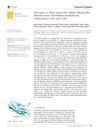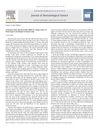Search
forProducts matching "collagen i"
Tracking 13 products like 360 Thicker Hair Growth Vitamins, 361 Biotin with Hyaluronic Acid, Collagen and Keratin, 542 Hairgenics Pronexa Hair Loss Therapy Conditioner, 135 Hair Vitamins and 188 L’Oréal Professionnel Aminexil 1.5% Advanced Anti-Hair Loss Programme from by companies like Amazon, Manual and ZeeMoreUncle. View all 13 products »
Sort by
Research
30-60 / 1000+ results
research The Effect of Nanoparticle-Incorporated Natural-Based Biomaterials on Cells and Activated Pathways: A Systematic Review
Nanoparticles added to natural materials like cellulose and collagen can improve cell growth and wound healing, but more testing is needed to ensure they're safe and effective.

research Structures of Three Polycystic Kidney Disease-Like Domains from Clostridium Histolyticum Collagenases ColG and ColH
The study concludes that certain domains in Clostridium histolyticum enzymes are structurally unique, bind calcium to become more stable, and play distinct roles in breaking down collagen, with potential applications in medicine and drug delivery.

research Tissue Mechanics in Haired Murine Skin: Potential Implications for Skin Aging
Older mice have stiffer skin with less elasticity due to changes in collagen and skin structure, affecting aging and hair loss.

research Connective Tissue Sheath of Hair Follicle Is a Major Source of Dermal Type I Procollagen in Human Scalp
The hair follicle's connective tissue is a key source of a certain collagen in human scalp skin.
research In Search of the Common Mechano-Chemical Pathways During the Regeneration of Spiny (Acomys Cahirinus) and Laboratory (Mus Musculus) Mouse Skin
Spiny mice regenerate skin better than laboratory mice due to larger hair bulges, more stem cells, and different collagen ratios.
research Ex Vivo SIM-AFM Measurements Reveal the Spatial Correlation of Stiffness and Molecular Distributions in 3D Living Tissue
Collagen makes skin stiff, and preservation methods greatly increase tissue stiffness.

research Effects of a New Recombinant Human Collagen on Skin Aging
The new recombinant human collagen can help slow skin aging and repair skin, while also controlling inflammation.

research Hair Follicle Regeneration In Vitro
Hair growth can be induced by transplanting certain cells, but these cells lose their properties during culturing. The best cell interaction happens in a liquid medium under gravity, and using collagen doesn't help. Future research could focus on using growth factors to stimulate these cells.

research Androgenetic Alopecia in Males: A Histopathological and Ultrastructural Study
Hair loss in males involves inflammation, collagen buildup, and follicle damage, with severity increasing with age and baldness duration.
research Radiofrequency Treatment Induces Fibroblast Growth Factor 2 Expression and Subsequently Promotes Neocollagenesis and Neoangiogenesis in the Skin Tissue
Radiofrequency treatment helps rejuvenate skin by boosting collagen and blood vessel growth.
research Mesenchymal Stem Cells Pretreated With Collagen Promote Skin Wound-Healing
Collagen-enhanced mesenchymal stem cells significantly improve skin wound healing.
research Keratin Promotes Differentiation of Keratinocytes Seeded on Collagen/Keratin Hydrogels
Keratin helps skin cells mature when added to a collagen mix, which could be important for skin and hair health.

research Revitalizing Skin, Hair, Nails, And Muscles: Unlocking Beauty And Wellness With Vegan Collagen
Vegan collagen builder improves hair growth, skin smoothness, and reduces wrinkles and pain.

research Clinical Efficacy of Silk Sericin Dressing with Collagen for Split-Thickness Skin Graft Donor Site Treatment
Silk sericin dressing with collagen heals wounds faster and improves scar quality better than Bactigras.

research Effect of Ginsenoside Rd on Dermal-Epidermal Junction in Fibroblast
Ginsenoside Rd may help improve skin aging by increasing collagen in the skin.
research Pilot Study: Autologous Platelet-Rich Plasma Used in a Topical Cream for Facial Rejuvenation
Topical PRP cream may improve facial skin by boosting collagen.

research Correction of Wrinkles, Peau d’Orange, and Thin Dermis of the Face by Neocollagenesis Using Novel Collagen Stimulating Slurry Protocol
The new facial treatment improved wrinkles and skin thickness, with most patients seeing results within a month, despite some temporary swelling and bruising.

research Microneedling and Oral Collagen Replacement as Strategies for Skin Rejuvenation
Microneedling with oral collagen improves wrinkles better than microneedling alone.

research Use of Plasma Gel as Autologous Collagen Biostimulator with Simplified Technique: Case Report
Plasma gel and PRP treatments improve skin and hair with minimal side effects.

research Electrospun Scaffold of Collagen and Polycaprolactone Containing ZnO Quantum Dots for Skin Wound Regeneration
The new wound dressing helps skin heal faster and fights infection.
research Miliacin Associated with Polar Lipids: Effect on Growth Factors Excretion and Extracellular Matrix of the Dermal Papilla Hair Follicle Model Maintained in Survival Conditions
Miliacin combined with polar lipids boosts hair growth factor production, cell renewal, and increases collagen in hair tissue.
research Nanotechnology Approaches in Chronic Wound Healing
Nanotechnology shows promise for better chronic wound healing but needs more research.

research Differentiation of Mouse Induced Pluripotent Stem Cells into a Multipotent Keratinocyte Lineage
Scientists turned mouse stem cells into skin cells that can grow into skin layers and structures.

research Skin Connective Tissue and Aging
Menopause reduces skin collagen and elasticity, and while estrogen therapy can help, its risks require careful consideration.

research Applications of Mesenchymal Stem Cells in Skin Regeneration and Rejuvenation
Mesenchymal stem cells show potential for skin healing and anti-aging, but more research is needed for safe use, especially regarding stem cells from induced pluripotent sources.

research Skin Aging
After menopause, women lose a lot of skin collagen, but estrogen replacement might improve skin health.

research Mechanical Forces in Skin Disorders
Skin problems can be caused or worsened by physical forces and pressure on the skin.

research Microporous Dermal-Mimetic Electrospun Scaffolds Pre-Seeded with Fibroblasts Promote Tissue Regeneration in Full-Thickness Skin Wounds
Pre-seeding scaffolds with fibroblasts improves skin wound healing.

research Design of a Multifunctional Biomaterial Inspired by Ancient Chinese Medicine for Hair Regeneration in Burned Skin
The new biomaterial inspired by ancient Chinese medicine effectively promotes hair growth and heals wounds in burned skin.